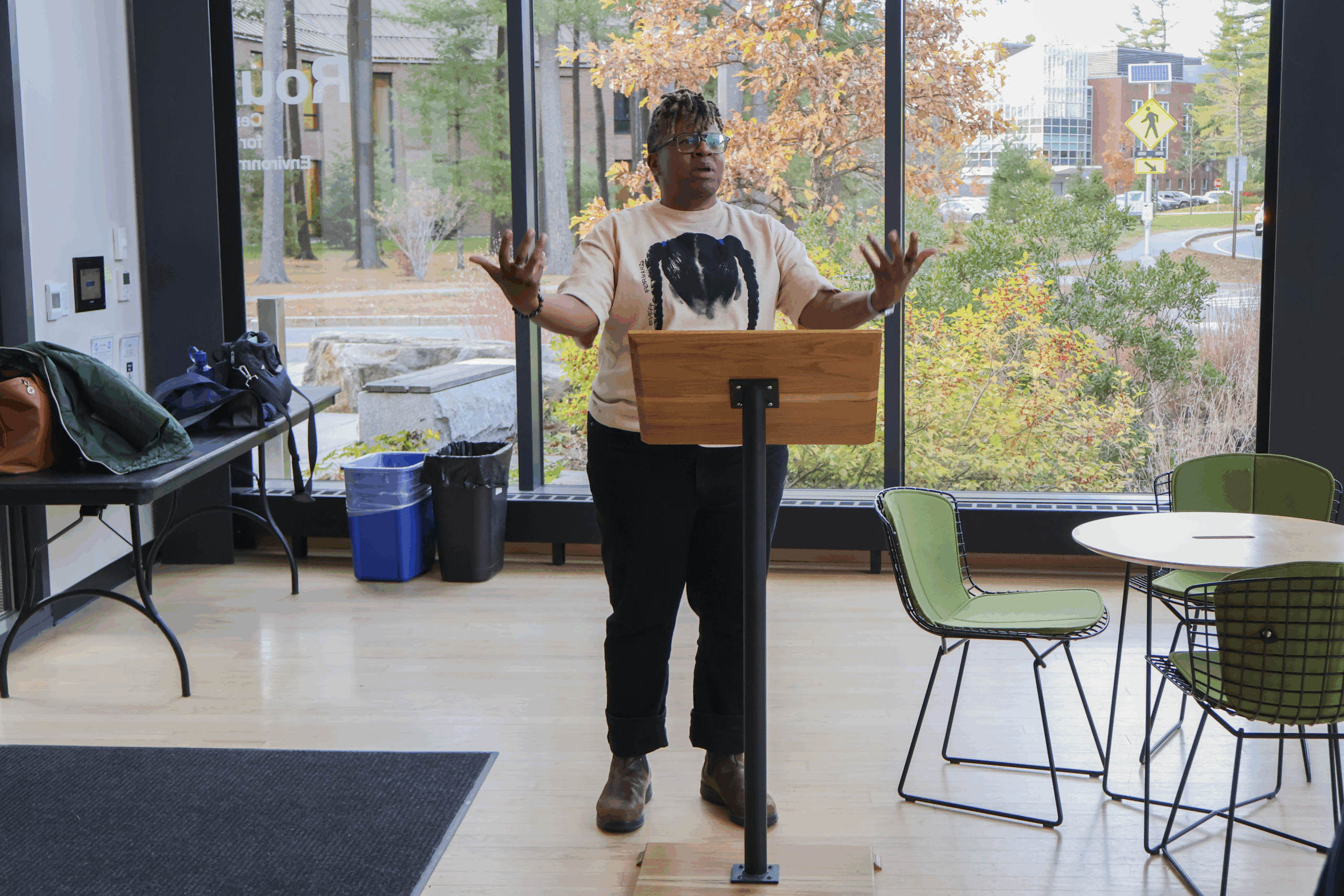Professors discuss antisemitism, Islamophobia and transphobia in panel
October 31, 2025
 Abigail Hebert
Abigail HebertEditor’s Note, Saturday, November 1, at 4:21 p.m.: A previous version of this article misinterpreted a quote as saying that an attendee felt the talk was ineffective in linking together the three forms of bigotry discussed. He instead meant that he wanted to attend the talk to learn more about the intersection between the three forms of bigotry. The article has been updated to reflect this.
On Tuesday afternoon in the Roux Lantern, a panel of three Bowdoin professors unpacked antisemitism, Islamophobia and transphobia. Professor of Religion and Middle Eastern and North African Studies Robert Morrison presented on antisemitism, Assistant Professor of English and Director of the Mellon Mays Undergraduate Fellowship Program Zahir Janmohamed on Islamophobia and Associate Professor of Gender, Sexuality and Women’s Studies Keona Ervin on transphobia. The event was sponsored both by the Middle East and North African Studies and Gender, Sexuality and Women’s Studies departments.
According to Morrison, combining the three issues into one panel was intended to bridge community divides.
“These are all serious issues. And sometimes they’re treated in isolation from each other, and that’s important because there’s so much you can and should say about antisemitism or Islamophobia or transphobia,” Morrison said. “But what we’ve also been thinking is that by talking about it together, we’re un-isolating these populations.”
Ervin began her presentation by defining transphobia.
“Transphobia speaks to anti-trans animus, often political violence, violence of a political, social sort, the notion that the world would be a better place if there were less or no trans people in the world,” Ervin said.
She continued by acknowledging the current state of transgender rights in the United States.
“We’re at a critical inflection point. We have forms of heightened violence, physical violence, symbolic violence, administrative, bureaucratic violence, epistemic violence and so on. And what we’re seeing, I think, is a move from punishment and criminalization to a politics of erasure,” Ervin said. “So there are attacks happening at every level.”
Similarly, Morrison began his speech by defining antisemitism.
“According to the Jerusalem Declaration on Antisemitism, antisemitism is ‘discrimination, prejudice, hostility or violence against Jews as Jews or Jewish institutions as Jewish,’” Morrison said.
Morrison also discussed the controversial definition of antisemitism from the International Holocaust Remembrance Alliance, which was recently adopted by Harvard University and Columbia University in the wake of pro-Palestine student protests.
“It states that Jews should have the right to self-determination…. But this same definition also states that Israel is subject to the same criticism as other countries. Many Jews will recoil understandably at statements that Zionism is racist or that Israel is committing genocide in Gaza, yet other countries have been criticized for racist and genocidal policies. These are hard conversations, but the definitions that we have of antisemitism really require us to have these conversations,” Morrison said. “And it’s a challenge to have them in the way that Jews in our community don’t feel singled out, harassed or bullied.”
In his presentation on Islamophobia, Janmohamed acknowledged the Israel-Palestine conflict and its impact on conversations around Islamophobia.
“A criticism I have towards some of the nationwide Muslim groups [is] saying that Israel’s attack is Islamophobic. That sort of obfuscates what’s happening, and it obfuscates the settler-colonial project of the Israeli state, but it also erases Palestinian Christians as well,” Janmohamed said. “While Israel often does employ some public messaging, such as [that] Palestinian men are trying to steal Israeli women…, [this] is not in its essence Islamophobic. We should see it through the language of anticolonialism.”
Janmohamed also iterated the importance of telling Palestinian stories outside the context of the ongoing conflict in Gaza.
“I saw this Palestinian film recently that just blew me away called ‘Thank You for Banking with Us,’” Janmohamed said. “What I loved about it was that, first of all, there were no Israelis present, because the director said, ‘Israel is already occupying your society. Why should they occupy your stories?’”
In response to a question about the role of anti-Zionism causing antisemitism among the American left, Morrison argued that anti-Zionism is not a monolithic movement.
“I think that some things that some anti-Zionists might be discussing in apparently good faith can nevertheless be antisemitic,” Morrison said. “I also should say though, sometimes anti-Zionism isn’t antisemitic either at all or in a large part. First of all, there are Jews who are extremely critical of Israel, and if you’re calling them self-hating Jews, I think the discussion is pretty much over. There are also Palestinians. Obviously, they don’t like Israel, and I think they don’t like it in large part because of their day-to-day interactions with Israelis or the Israeli army. And that might have become somewhat antisemitic, but I don’t think it was at first.”
Joey McGlaughlin ’27 said he attended the talk to learn more about the links between the three forms of bigotry discussed.
“I think antisemitism, Islamophobia and transphobia are all pretty prominent contenders in [a] politics and civics discussion,” McGlaughlin said. “I don’t really see a lot about how they intersect, and I was really hoping to gain more insight about that intersection.”

Comments
Before submitting a comment, please review our comment policy. Some key points from the policy: